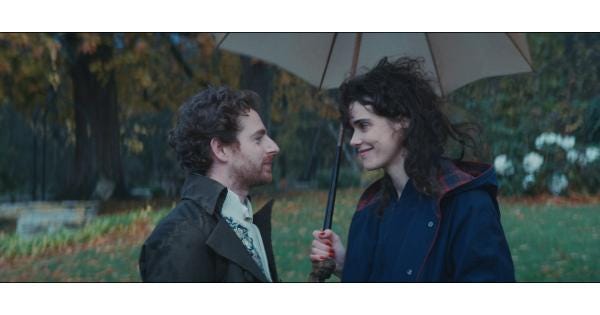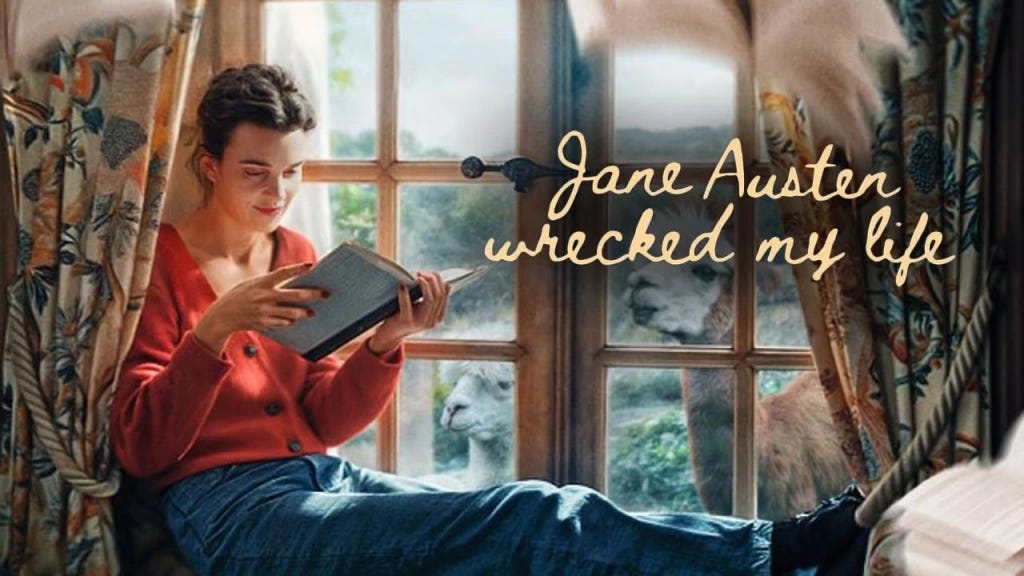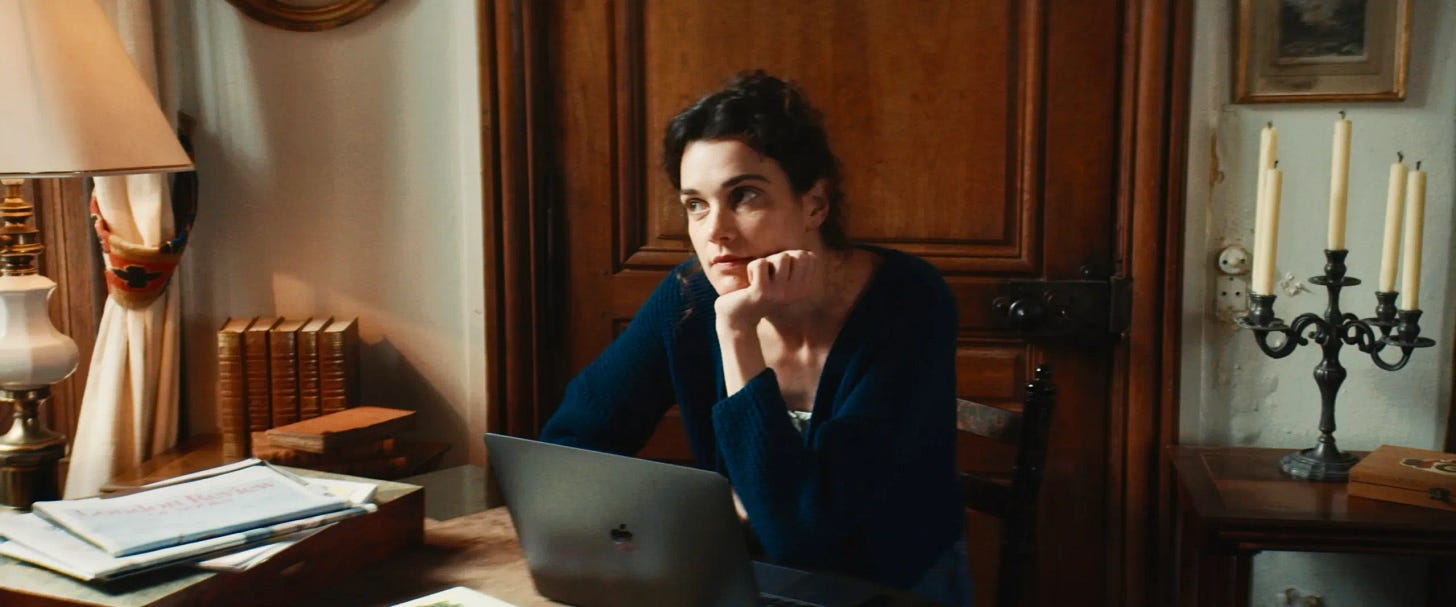Don’t Get Married Until You Write the Book! Review of Laura Piani’s 'Jane Austen Wrecked My Life'
Some spoilers inside.
Note to readers: I’ll be applying for a Jane Austen residency in the coming months, & it would be great if you could share Modern Austen with anyone you think might enjoy reading it. This is the project I want to work on with the residency, & it would really help to have more readers. Thank you <3
I’ll begin this review with a caveat: I watched Jane Austen Wrecked My Life in Barcelona with Spanish subtitles, & I’m not even close to fluent in Español yet. While most of the film is set at a Jane Austen residency in England, it is a French film, so our heroine & hero & other characters speak French as often as they speak English. This is my long-winded way of saying that there are probably nuances in the film that I’ve missed.
Laura Piani’s romantic comedy has largely received positive reviews from critics, but I’ve started to see Austen fans online place it in the same camp with other Austen travesties like the 2022 Persuasion adaptation for Netflix (maybe one day I’ll write about how we all just need to get over it & the adaptation really isn’t that bad). The biggest criticism I’ve seen from these Austen “fans” is that there’s not enough Austen in the film to warrant putting her name in the title. Aha! They were expecting more Regency dress, more of an obsession with Austen’s novels & characters, &, possibly, a plot centered around how Jane Austen ruined love for Piani’s heroine. But that is EXACTLY what I was afraid this movie would be with a title like Jane Austen Wrecked My Life. There is already a genre of Jane Austen content where a modern woman becomes so engrossed with the love stories & Regency manners that she can no longer bear living in her own time. I’m tired of these plots, because they reduce Austen’s work to fairytale love stories, which Piani is pushing against in her romantic comedy.
Jane Austen Wrecked My Life has fairytale elements, & Agathe Robinson (Camille Rutherford) is our hapless heroine. She lives with her sister & nephew, & while she’s a little bit lonely (but mostly horny), she’s not actively looking for love. Has she given up on the reality of love, preferring to read the missed love connections notes left by strangers at Shakespeare & Co. (where she works as a bookseller) or to simply re-read Sense & Sensibility (her favorite Austen novel, she tells a customer)? There’s some romantic potential in her life with her only friend & fellow bookseller Félix (Pablo Pauly), who, it’s obvious from the beginning of the film, will be one of Agathe’s love interests (it is a romcom) but probably won’t win her heart because he’s too Bingley to be the romantic hero. To be the right match for our aspiring, creatively-blocked heroine, who sees herself as Anne Elliot. Félix is friend-zone material, as evidenced from the easy way they talk with each other; Félix even feels comfortable talking about his love life with Agathe.

Agathe also aspires to write a novel but finds herself in a creative rut. This, I feel, is the real inspiration for the film’s title: Jane Austen is too good, & she’s ruined writing for the rest of us. It’s just one block she’ll have to overcome to write the book she wants to be capable of writing. Her desire for love & divine inspiration converge one night while dining alone in a Chinese restaurant. The restaurant serves wine in little porcelain cups with erotic pictures of men or women—depending on your preference—at the bottom. When she swallows her wine & stares, intrigued, at the nude Asian man, the restaurant suddenly transforms into the setting of Agathe’s horny fantasy. No one else is in the restaurant to see the man at the bottom of her cup come to life: he has shoulder-length hair with a hint of a moustache & a toned torso. He takes Agathe in his arms & they dance. That’s it. That’s the fantasy. At least that’s all we’re allowed to see. Back in reality, Agathe takes out her pen & begins to write on a placemat. This is the beginning of her romance novel about a woman whose fantasy of love becomes more appealing to her than reality.
Perhaps what the film lacks is a clear definition for what a romantic-comedy heroine should be & how that compares with Austen’s definiton. Agathe says she most identifies with Anne Elliot, but we all do after we’ve passed our prime for a Regency-era marriage. And is Anne Elliot who a romcom heroine should be? Well, Anne Elliot Agathe is not. She is a beautiful woman—tall, thin, elegant. She’s very beautiful in a French way. But this beauty is undercut by how awkward she is in her body. The actress Camille Rutherford knows that her long limbs are meant for physical comedy. While she’s very elegant & sophisticated standing still, she exudes gracelessness & liveliness every time she moves. In an interview with Under the Radar Magazine, Rutherford says that it was important for her to be funny in this role. That seems to be Piani’s thesis for the film, as well: Jane Austen believed that women are funny, & she made them funny, imperfect creatures in her novels. I just wish the film wrestled with this point more, presented it as more of a conflict. The most we get is a brief scene where Agathe tells Jane Austen’s great-great-great-great nephew—a contemporary literature professor who doesn’t think much of his famous aunt’s work—that Austen’s greatest contribution to English literature was to make women human.
Agathe happens to meet Jane Austen’s great-great-great-great nephew, because he helps his aging parents run their annual Jane Austen residency in England, where qualified writers are invited to work on their projects for a few weeks. Being the supportive friend that he is, Félix submits Agathe’s unfinished draft of her romance novel, & she receives an invitation to become a resident.—She isn’t thrilled, & she makes excuses to not go. But she eventually finds herself in a car with Félix, who drives her to the ferry, & they part with a kiss. Two points in a love triangle, & Oliver (Charlie Anson), the nephew, makes three. Oliver & Agathe first meet at the ferry, where he’s holding a sign that reads “Agathe Robinson.” “I’m Agathe Robinson,” she says, which takes Oliver by surprise. “I thought you’d be older.” He doesn’t say why; perhaps the draft of her novel reads like it’s been written by an older woman. It’s immediately obvious that Oliver will be the one to win Agathe’s heart, if only because of his smoldering eyes.
Even before Oliver tells Agathe that he’s not a JA fan, their introduction doesn’t go well. Agathe has a fear of riding in cars, so she throws up all over Oliver’s shoes when he tells her that he’ll be driving her in his vintage sports car. But Oliver seems to forgive this;—all ill will is on Agathe’s side. She decides to detest him because of his comment the way Lizzy holds Darcy’s comment about her looks against him for the first half of P&P. To make matters worse, the car breaks down on a country road, & they’re stuck for the night:—Agathe’s hate growing deeper, Oliver trying to make the best of the situation. They may be enemies in Agathe’s eyes at this point, but it’s clearly easy for them to open up to each other, whether they’re speaking English or French. And I think it’s important that they’re both able to speak each other’s native tongues. A metaphor, perhaps, for how deeply they understand one another.
Agathe & Oliver arrive at the estate the next morning via apple cart, & the rest of the romantic comedy unfolds at the Jane Austen residency. I will say that the criticism that this film has very little to do with Jane Austen applies to this residency. At least I find it confusing. The 3 other residents seem to be working on serious political & even radical scholarship, which don’t seem to be inspired by Jane Austen. There is a Regency ball that Félix shows up for, complicating Agathe’s growing feelings for Oliver. But our heroine & hero are able to share a dance—the equivalent of sex in Austen—which is less like Darcy & Lizzy’s sparring match at Netherfield & more like Emma & Knightley’s first dance.

So the purpose of the residency is to be a backdrop. It provides rooms where Oliver & Agathe can awkwardly walk in on each other—very Austen. Oliver is intrigued by Agathe from the first moment he meets her, which you can tell by the way he stares at her from across every room they’re in & intently listens to everything she says. Agathe slowly lets down her resistance &, as with Lizzy & Emma, we’re left wondering when the precise moment was that she fell in love. Unfortunately, Agathe is finding it difficult to fully open herself up to love & her writing. During the residency, she isn’t able to write a single new word, despite having the porcelain cup from the Chinese restaurant to inspire her.
The real love triangle of the film isn’t between Agathe, Oliver, & Félix;—it’s between Agathe, writing, & love. What Laura Piani has done is given us a romcom where the heroine can’t fall in love until she finishes the book she’s set out to write. And it’s Oliver, former Austen detractor, who gives her the advice she needs to leave the residency, leave him behind, & finish the romance novel she started. I feel like I’ve spoiled this movie enough, so I’ll leave you guessing about whether our heroine finishes her novel & gets together with Oliver (or Félix). Hint: It is a romcom. Should you see this movie? I mean, it’s only 1 hour 34 minutes, & I found it delightful. And I’m now up for watching Camille Rutherford in anything! If for no other reason, watch it for Camille Rutherford.




I saw the movie and enjoyed it. I loved how the filmmaker highlighted the subtle physical gestures that express desire, something I associate with contemporary Jane Austen films (like the P&P hand flex). Sexy and fun film.
I truly loved this review and will definitely watch this movie as soon as possible 💕